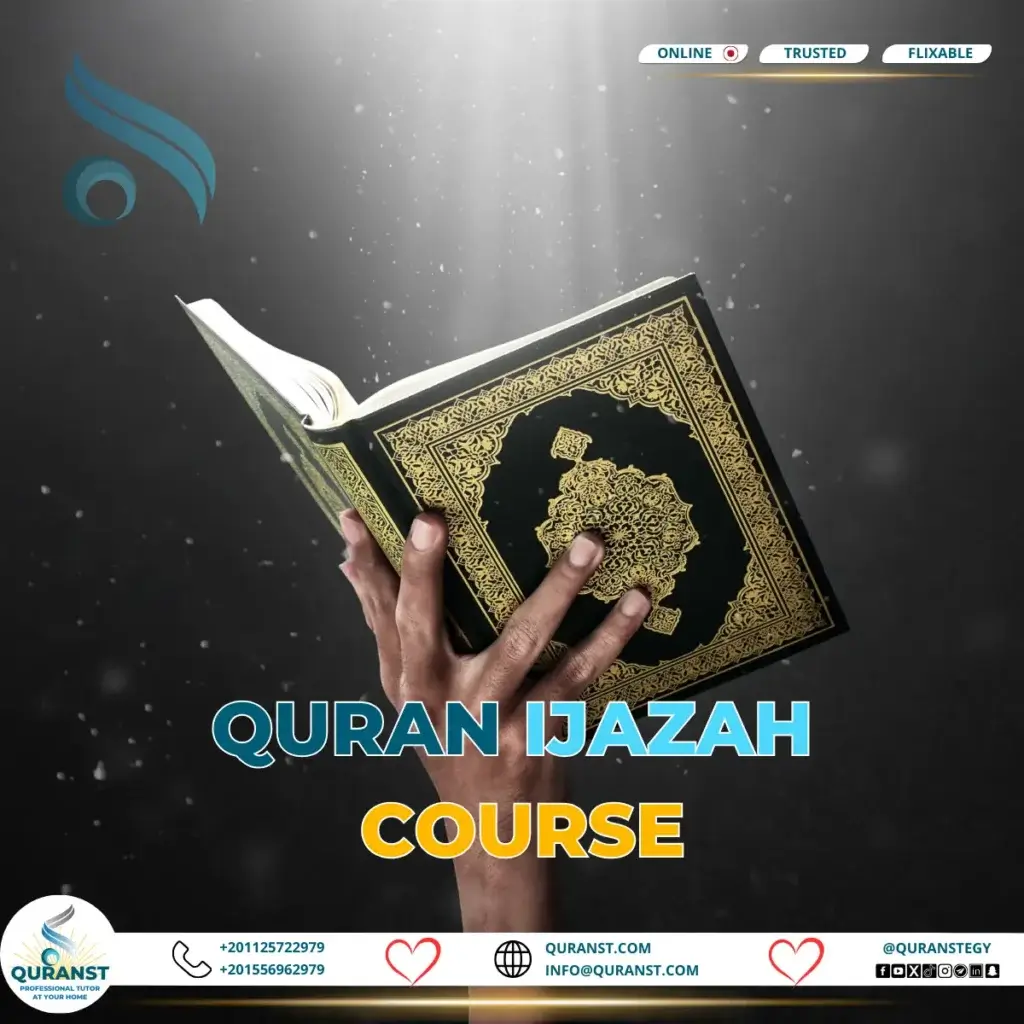The Quran, the sacred scripture of Islam, holds unparalleled significance in the lives of Muslims worldwide. Learning, understanding, and reciting the Quran with precision is not only an act of devotion but a lifelong spiritual and intellectual journey. For those who seek to reach the pinnacle of Quranic recitation, memorization, and understanding, the concept of Ijazah—a certification or license to teach and recite the Quran—is both a privilege and a responsibility. The Ijazah course offered by Quranst Institute stands as a gateway for students who wish to achieve this honor. This article delves into the importance of the Quran Ijazah program, its structure, and the profound opportunities it offers for aspiring Quran scholars.
Understanding the Concept of Ijazah
The term Ijazah in Arabic means "permission" or "authorization." In the Islamic tradition, it refers to a certification granted by a qualified teacher to a student, permitting them to teach or recite the Quran according to a specific methodology. The Ijazah system is a cornerstone of Islamic education, especially in the study of Quranic sciences, Tajweed (the art of Quranic recitation), and Qira'at (the various modes of reciting the Quran). A person who holds an Ijazah in Quranic recitation or memorization has demonstrated mastery in these areas and is authorized to pass on this knowledge to others.
The Ijazah system dates back to the time of the Prophet Muhammad (PBUH), who taught his companions how to recite the Quran. These companions passed their knowledge to the next generation, continuing an unbroken chain of transmission (sanad) that links modern-day reciters back to the Prophet. This chain of transmission is one of the most remarkable features of the Ijazah system, as it ensures that the Quran is preserved with absolute precision.
For students of the Quran, obtaining an Ijazah is a mark of distinction. It represents not only a high level of proficiency in recitation or memorization but also a deep commitment to the Quran’s accurate preservation and transmission.
Quranst Institute: Leading the Way in Quranic Education
Quranst Institute is a well-established online platform known for its dedication to making high-quality Islamic education accessible to learners worldwide. The institute offers a range of courses that cater to different aspects of Islamic studies, including Quran memorization, Tajweed, Arabic language, and Islamic history. Among its most esteemed offerings is the Quran Ijazah Course, a comprehensive program designed to equip students with the knowledge, skills, and certification needed to become qualified Quran reciters and teachers.
Quranst Institute’s approach to the Ijazah course is rooted in traditional Islamic pedagogy while incorporating modern technology and teaching methods to make learning both effective and convenient. The course is led by highly qualified instructors, each of whom holds an Ijazah and has extensive experience in teaching the Quran. Through personalized instruction and a structured curriculum, Quranst Institute ensures that each student receives the guidance they need to succeed.
The Structure of the Quran Ijazah Course
The Quran Ijazah Course at Quranst Institute is meticulously structured to cover all aspects of Quranic recitation, memorization, and Tajweed. The course is divided into two main tracks: the Ijazah in Hifz (memorization of the Quran) and the Ijazah in Tajweed (rules of Quranic recitation). Depending on a student’s focus and prior experience, they can choose the track that best aligns with their goals.
1. Ijazah in Hifz (Memorization)
The Ijazah in Hifz is awarded to students who successfully memorize the entire Quran and demonstrate their ability to recite it from memory with precision and adherence to Tajweed rules. Memorizing the Quran is an extraordinary feat that requires dedication, discipline, and a systematic approach. At Quranst Institute, the Hifz course is designed to provide students with the tools and support they need to achieve this monumental goal.
- Personalized Learning Plans: Each student in the Hifz program receives a personalized learning plan based on their current level of memorization, their schedule, and their learning pace. This allows students to progress in a way that suits their individual needs.
- Daily Recitation and Review: Consistency is key in memorizing the Quran. Students are required to recite new portions of the Quran daily, as well as review previously memorized sections to ensure retention. Instructors work closely with students to monitor their progress and offer guidance on improving their memorization techniques.
- Tajweed Integration: Memorization without proper recitation is incomplete. Therefore, the Hifz course integrates Tajweed rules into the memorization process, ensuring that students not only memorize the Quran but also recite it with the correct pronunciation, rhythm, and articulation.
- Assessment and Certification: Once a student has completed the memorization of the Quran, they undergo a thorough assessment by a certified instructor. This assessment includes reciting the entire Quran from memory and demonstrating mastery of Tajweed. Upon successful completion, the student is awarded the Ijazah in Hifz.
2. Ijazah in Tajweed (Recitation)
The Ijazah in Tajweed is awarded to students who demonstrate mastery in the rules and techniques of Quranic recitation. Tajweed refers to the set of rules governing the pronunciation of Quranic letters and words, ensuring that the Quran is recited as it was revealed to the Prophet Muhammad (PBUH). Proper Tajweed is essential for conveying the Quran’s meaning accurately and for preserving the beauty and eloquence of its language.
- Foundational Tajweed Rules: The course begins with a comprehensive review of the foundational rules of Tajweed, including the articulation of letters (makharij al-huruf), the characteristics of letters (sifaat), and the rules of elongation (madd), nasalization (ghunnah), and merging (idgham).
- Advanced Tajweed Techniques: As students progress, they learn more advanced aspects of Tajweed, such as the correct application of stopping rules (waqf), the modulation of voice during recitation, and the various recitation styles (Qira’at). These advanced techniques help students enhance their recitation and prepare them for teaching others.
- Practical Application: The Tajweed course places a strong emphasis on practical recitation. Students engage in regular recitation sessions with their instructors, receiving immediate feedback and correction. This hands-on approach ensures that students internalize the rules of Tajweed and apply them consistently in their recitation.
- Assessment and Certification: Similar to the Hifz track, students pursuing the Ijazah in Tajweed must pass a rigorous assessment. This includes reciting the entire Quran under the supervision of a certified instructor, who evaluates their adherence to Tajweed rules. Upon successful completion, the student is awarded the Ijazah in Tajweed.
The Chain of Transmission (Sanad)
One of the most unique and revered aspects of the Ijazah system is the chain of transmission, or sanad, that accompanies the certification. When a student receives an Ijazah, they are not only certified to recite or teach the Quran but are also linked to an unbroken chain of teachers that extends back to the Prophet Muhammad (PBUH). This chain of transmission is a testament to the authenticity and preservation of Quranic knowledge across generations.
At Quranst Institute, great care is taken to uphold the integrity of this tradition. Each instructor who grants an Ijazah is part of a recognized sanad, ensuring that students who complete the course are connected to this rich lineage of Quranic scholars. This chain of transmission is more than just a historical formality; it represents a spiritual and scholarly bond that ties the student to the Prophet and the earliest Muslim community.
The Role of Technology in the Quran Ijazah Course
One of the key advantages of Quranst Institute’s Ijazah course is its use of modern technology to facilitate Quranic learning. The online platform allows students from all over the world to access high-quality Quranic education without the need for travel or relocation. This is particularly beneficial for those who live in regions where access to qualified Quranic teachers is limited.
The course is delivered through live, interactive sessions where students can engage directly with their instructors. These sessions are complemented by recorded lessons, allowing students to review material at their own pace. Additionally, the use of digital tools, such as online quizzes and voice recording submissions, enables instructors to provide detailed feedback on students’ recitation and memorization.
The flexibility of the online format is another significant advantage. Students can schedule their lessons around their personal and professional commitments, making it easier to balance their Quranic studies with other responsibilities. Whether a student is a working professional, a parent, or a full-time student, Quranst Institute’s online platform makes it possible to pursue an Ijazah without sacrificing other aspects of life.
The Spiritual and Scholarly Benefits of the Ijazah
Obtaining an Ijazah is not just about earning a certificate; it is a transformative experience that offers profound spiritual and scholarly benefits. For many students, the process of memorizing the Quran or mastering Tajweed deepens their relationship with the Quran and strengthens their faith. The
discipline, focus, and dedication required to complete the Ijazah course instill a sense of spiritual fulfillment and a closer connection to the words of Allah.
Scholarly, the Ijazah opens doors to further study and teaching opportunities. Those who earn an Ijazah are qualified to teach the Quran, passing on their knowledge to others and contributing to the preservation of the Quranic tradition. This ability to share the Quran with others is a significant responsibility and a source of great reward, as teaching the Quran is considered one of the noblest acts in Islam.
Furthermore, the Ijazah serves as a foundation for advanced studies in Quranic sciences. Many students who earn an Ijazah go on to pursue further education in fields such as Qira’at (the different modes of Quranic recitation), Tafsir (Quranic exegesis), and Islamic jurisprudence. The skills and knowledge gained through the Ijazah course provide a solid foundation for these advanced studies, enabling students to engage with the Quran on a deeper intellectual and spiritual level.
Conclusion
The Quran Ijazah Course with Quranst Institute offers a unique and invaluable opportunity for students to master the Quran, whether through memorization or recitation. Through a structured curriculum, personalized instruction, and a commitment to the authenticity of the sanad tradition, Quranst Institute ensures that its students receive the highest level of Quranic education.
For those who aspire to become certified Quran teachers or simply wish to deepen their understanding of the Quran, the Ijazah course is a pathway to spiritual growth and scholarly excellence. In a world where access to traditional Quranic education can be limited, Quranst Institute’s innovative online platform makes it possible for students everywhere to pursue this sacred journey, carrying forward the legacy of Quranic knowledge for future generations.


